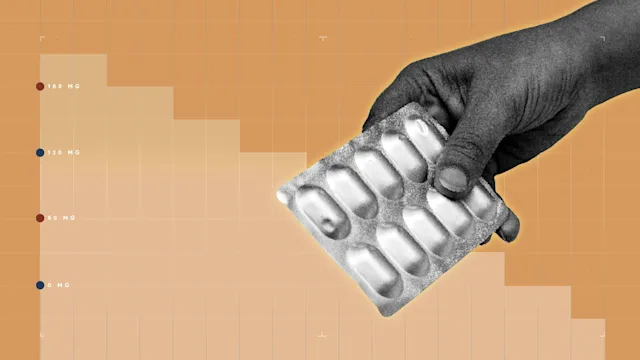Key takeaways:
Perimenopause starts when your period becomes more irregular and ends a year after your last period. Your fertility goes down during perimenopause, but it’s still possible to get pregnant.
Your chances of getting pregnant during perimenopause depend on many things including your age, your hormone levels, other conditions and whether you use fertility treatments.
You can increase your chances of getting pregnant by eating a diet rich in whole grains and fruit, taking vitamins like coenzyme Q, getting acupuncture, exercising (in moderation), and using assisted reproductive technology (ART).
Perimenopause sometimes catches women by surprise. It can start earlier than you expect and last for years. As your hormones and symptoms change, you might wonder about your fertility. Can you still get pregnant during menopause? The short answer is yes. But it’s more complicated than a simple yes or no. Read on to learn more about fertility during perimenopause, and what to know about your chances of getting pregnant during this time.
Quiz: Am I pregnant?
What age does perimenopause start?
Perimenopause usually starts in the mid- to late 40s. It’s a stage in menopause that starts when your periods become less regular, and ends a year after your last period (the official beginning of menopause).
But there’s a huge range of what’s normal. Some women will start perimenopause in their early 30s, while others won’t experience it until their 50s. For most women, perimenopause will last about 4 to 8 years. There are many other symptoms that can show up along with changes in your period frequency. You might have all of them or none of them.
Common symptoms of perimenopause include:
Changes in your period: This can mean less frequent or more frequent periods, heavy bleeding or spotting.
Hot flashes: This can be as simple as feeling a warm flush, or as strong as sweating through your clothes. About 75% of women will have hot flashes at some point during perimenopause.
Night sweats: Some women only experience the hot flashes at night while sleeping.
Trouble sleeping: About 40% of women start to have trouble sleeping through the night at this stage of menopause.
Vaginal dryness: This can lead to pain with sexual intercourse.
Mood changes: You might find yourself irritable or depressed. Depression can start or worsen during perimenopausal years.
What are the chances of getting pregnant in perimenopause?
Your chances of getting pregnant go down when you start perimenopause. But it’s still possible. As long as you’re getting your period occasionally, you still have a chance of getting pregnant.
Whether you still have a good chance of getting pregnant during perimenopause depends on:
Your age: Fertility for most women peaks in the early 30s and starts to decline after that.
Stage of perimenopause: You have a higher chance of getting pregnant if you’re in an earlier stage of perimenopause than a later stage.
Your hormone levels: A hormone called anti-mullerian hormone (AMC) measures your ovarian reserve and how many eggs you may have left. During perimenopause, your AMC and estrogen levels go down, and your follicle stimulating hormone (FSH) goes up. You have a better chance of getting pregnant if those changes in hormones haven’t started yet.
Other medical conditions: Some conditions, such as endometriosis or uterine fibroids, can make it harder to get pregnant. Chemotherapy, radiation, or surgery on your ovaries can lower the number of remaining eggs and might also affect fertility.
Natural versus assisted fertility treatments: During perimenopause, your chances of getting pregnant are increased by using fertility treatments like assisted reproductive technology (ART)
It’s hard to report clear statistics on a person’s chance of getting pregnant during perimenopause because these factors can be very different from person to person. But experts do know that age plays one of the biggest roles in fertility. Your chances of getting pregnant naturally within a year of trying are about:
75% at age 30
66% at age 35
44% at age 40
- Vivelle-DotDotti and Estradiol
- ClimaraEstradiol
- DivigelEstradiol
By age 45, it’s rare to get pregnant naturally. However, the birth rate for women older than 40 years has actually been going up in recent years. This is probably because more women are waiting longer to have children — and more are using ART.
And it’s worth noting that in 2017, there was a birth rate of 0.9 for every 1,000 women ages 44 to 49 years. For comparison, the birth rate for women ages 30 to 34 years was 100.3 per 1,000 women.
What are your chances of getting pregnant during menopause with in vitro fertilization?
If you’re trying to get pregnant using in vitro fertilization (IVF), your chances of pregnancy also go down with age. In 2010, around 41.5% of IVF cycles in women younger than 35 years led to a live birth. It went down to 12.4% in women ages 41 to 42 years, 5% in women ages 43 to 44 years, and 1% in women older than 44 years.
These chances increase if a woman uses donor eggs (eggs from the ovary of a healthy young donor). In these cases, about 51% of the cycles result in a live birth, regardless of your age.
Whether to use donor eggs is a very personal decision. But it’s worth knowing that this can dramatically increase the odds of getting pregnant if you’re perimenopausal.
How can I tell if I’m pregnant during perimenopause?
It can be hard to tell if you’re pregnant in perimenopause since there are many symptoms that can happen in both conditions.
Both pregnancy and perimenopause can lead to:
Missing your period
Feeling tired
Mood changes
Sleep problems
Pregnancy is more likely to lead to:
Nausea
Breast fullness
Vaginal discharge
Perimenopause is more likely to lead to:
Vaginal dryness
Hot flashes or night sweats
The best way to know if you’re pregnant or not is to take a pregnancy test. You can buy an over-the-counter (OTC) urine pregnancy test, or contact your healthcare professional to get a blood test. Both tests measure the amount of the pregnancy hormone called human chorionic gonadotropin (HCG). A blood test is the most accurate test, but the at-home urine test can detect most pregnancies by a day after the missed period.
Are there risks to getting pregnant in perimenopause?
Pregnancy in older women tends to be more high-risk. Since egg quality goes down as you get older, the embryo has a higher chance of having a problem with the chromosomes. Also, older women are more at risk for health problems. You can still have a healthy pregnancy if you get pregnant during perimenopause. But you should be monitored more closely.
Getting pregnant during perimenopause increases the risk for:
Miscarriage
Preterm labor
High blood pressure during pregnancy (gestational hypertension)
Needing a C-section to deliver the baby
Stillbirth (scheduling an earlier delivery for older moms can reduce this risk)
How can you increase fertility during perimenopause?
Even though your fertility goes down during perimenopause, there are things you can do to help your chances. You can increase your fertility during perimenopause by:
Eating a healthy diet: Foods high in whole grains, fruit, and unsaturated fat may help overall fertility.
Taking supplements: Coenzyme Q may help improve egg quality. Omega-3-fatty acids can increase your chances of getting pregnant. Other vitamins that may help improve fertility include folic acid, selenium, and vitamin D.
Acupuncture: Some studies show that acupuncture can increase your chances of getting pregnant.
Exercise: Regular exercise can boost your chances of getting pregnant. But keep in mind that vigorous exercise might actually lower your odds. Talk with your healthcare professional about the level of exercise that’s best for you if you’re trying to conceive.
Assisted reproductive technology (ART): Fertility treatments like IVF can boost your chances of getting pregnant.
If I don’t want to get pregnant, when can I stop using birth control during perimenopause?
The American College of Obstetricians and Gynecologists and the North American Menopause Society recommend that if you don’t want to become pregnant, you should continue using some type of birth control until menopause, or ages 50 to 55 years. Some types of hormonal birth control can have the added benefit of improving some perimenopause symptoms as well.
The bottom line
Your fertility goes down during perimenopause. But the chances of getting pregnant during this phase is not zero. Your chances depend on your age, your hormone levels, other medical conditions, and whether you’re using fertility treatments. If you’re trying to get pregnant, there are other things you can do to increase your chance of getting pregnant. If you don’t want to get pregnant, you should use birth control until menopause or the age of 50 to 55 years.

Why trust our experts?


References
American College of Obstetricians and Gynecologists. (2014). Female age-related fertility decline.
American College of Obstetricians and Gynecologists. (2023). Having a baby after age 35: How aging affects fertility and pregnancy.
Avagliano, L., et al. (2022). Risk of stillbirth in older mothers: A specific delivery plan might be considered for prevention. The Journal of Maternal-Fetal and Neonatal Medicine.
Centers for Disease Control and Prevention. (2023). When women can stop using contraceptives.
Cho, M. K. (2018). Use of combined oral contraceptives in perimenopausal women. Chonnam Medical Journal.
Delabere, I., et al. (2020). Knowledge about the impact of age on fertility: A brief review. Upsala Journal of Medical Sciences.
Florou, P., et al. (2020). Does coenzyme Q10 supplementation improve fertility outcomes in women undergoing assisted reproductive technology procedures? A systematic review and meta-analysis of randomized-controlled trials. Journal of Assisted Reproduction and Genetics.
Han, Y., et al. (2023). Neuroendocrine pathogenesis of perimenopausal depression. Frontiers in Psychiatry.
Lima, L. G., et al. (2022). Relation between selenium and female fertility: A systematic review. Gynecology and Obstetrics.
Meng, X., et al. (2023). Influence of vitamin D supplementation on reproductive outcomes of infertile patients: A systematic review and meta-analysis. Reproductive Biology and Endocrinology.
Miraglia, N., et al. (2022). Folate supplementation in fertility and pregnancy: The advantages of (6S)5-methyltetrahydrofolate. Alternative Therapies in Health and Medicine.
Mussawar, M., et al. (2023). The effect of physical activity on fertility: A mini-review. F &S Reports.
Nakano, K., et al. (2012). Reproductive history and hot flashes in perimenopausal women. Journal of Women’s Health.
National Vital Statistics Report. (2018). Births: Final data for 2017. Centers for Disease Control and Prevention.
Nelson, S. M., et al. (2023). Anti-Müllerian hormone for the diagnosis and prediction of menopause: A systematic review. Human Reproduction Update.
North American Menopause Society. (n.d.). Menopause 101: A primer for the perimenopausal.
Santoro, N. (2016). Perimenopause: From research to practice. Journal of Women’s Health.
Stanhiser, J., et al. (2022). Omega-3 fatty acid supplementation and fecundability. Human Reproduction.
Tower, C. (2009). Pregnancy in peri- and postmenopausal women: challenges in management. Menopause International.














